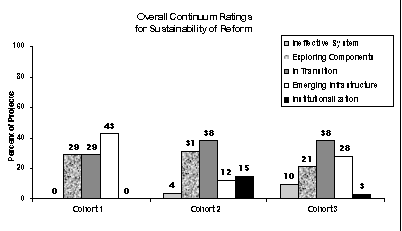page 12 of 13
Chapter Nine
Sustainability of Reform
The LSC awards are intended to provide support for professional development during the grant
period and to develop strategies to ensure that the districts will continue to support reform after
the funded period. As a prelude to rating participating LSC districts on the sustainability of
mathematics and science reform, evaluators were asked to review their notes of interviews with
PIs and district personnel, project documents (e. g., proposals and annual progress reports),
observations of professional development activities and district meetings, and district documents
(e. g., policy manuals and budget reports). Based on these data, evaluators were asked to reflect
on the extent to which the LSC has enhanced both the capacity and the will of the districts to
provide high- quality mathematics and science professional development.1
Elements of Sustainability
Evaluators' attention to the area of sustainability was rather limited, as might be expected given
that most of the projects were in their initial phases. However, based on evaluation reports, there
was evidence that some projects included elements that might contribute toward maintaining
high- quality professional development programs.
Developing a Cadre of Teacher Leaders
Evaluators reported that most LSC districts are working to build the capacity of teacher leaders
and are involving these teachers in facilitating professional development activities. The hope is
that the district will continue to support these teachers to work in a leadership capacity after the
LSC project. Evaluators noted, however, that in many cases districts appear to be dependent on
the LSC grant for planning and delivering high- quality professional development, and there is no
system in place for ongoing leadership development after the LSC grant period.
Providing Incentives for Professional Development
Evaluators reported that quite a few of the LSC districts are changing their policies to increase
teacher participation in high- quality professional development.
[A number of] districts have negotiated 20 extra hours of staff development each
year for their teachers. The [LSC] project has made districts aware that there is
insufficient time for teachers to meet and reflect on their practice, conditions
necessary for sustained change. These negotiated days represent a significant
change and it is anticipated as other districts negotiate new contracts, they will
also increase the required time for teacher professional development.
* * *
...a professional development plan for beginning teachers that requires 150 hours
of professional development is in place. The 150 hours of professional
development is being redone and there will be a heavy emphasis on content
requirements for elementary school teachers. The current [LSC] summer institute
for new and beginning teachers is a component of this content requirement and
will continue when the [LSC] grant ends.
Encouraging Districts to Increase their Investments in Mathematics and science Education
Evaluators described several mechanisms to enhance district support of mathematics and science
education. Examples include:
- Providing a framework for the use of existing funds
The introduction of the [LSC] project actually gave a platform to move more
money into the area of math and science. Technology funds (over $300,000)
and Goals 2000 funds were moved into the area of professional development.
It gave an initial framework for funds that were available.
- Strategic placement of teachers on district committees
The LSC program is now placing emphasis on increasing willingness of the
districts to provide resources for ongoing, high- quality science professional
development programs through developing a better informed collection of
principals and positioning of enthusiastic and confident, knowledgeable
teachers on key district, school, and department committees.
- Obtaining district commitment to continue funding resource centers to provide
professional development materials or both
The [science education center] and the district's financial commitment to keep
the center operating once the LSC funding period has ended, is an important
"mechanism" that can continue to offer ongoing PD opportunities to teachers
interested in improving their practice.
Overall Ratings of Sustainability
In addition to noting specific ways in which the districts were, and were not, creating
mechanisms to sustain the LSC reform process, evaluators assigned each district a "sustainability
rating" on a five- point continuum from 1, "predominately ineffective system" to 5,
"institutionalization" of a high- quality professional development system.
Figure 39 summarizes district continuum ratings of sustainability by cohort. Continuum ratings
across cohorts once again suggest some trend toward increased sustainability as projects (and
district involvement) mature; however, this pattern is less striking for sustainability than it was
for supportiveness. The modal rating for Cohort 1 districts indicates that many of them are at the
"emerging infrastructure" stage. The modal rating for newer (Cohort 2 and 3) districts is "in
transition." Given the time needed for districts to institutionalize reform, this repeated pattern
suggests that some Cohort 2 and Cohort 3 districts had taken some important initial steps toward
aligning policy and practice and institutionalizing high- quality professional development before
receiving their LSC awards.

Figure 39
Summary
- While evaluator reports tended to be rather sketchy in the area of sustainability, they
provided some evidence that LSC districts are beginning to grapple with sustaining the
reforms begun during the grant period. Evaluators reported a number of ways in which
districts are building upon the LSC efforts in order to institutionalize the reform process,
including the convergence of resources in support of the LSC vision, the development of
incentives for continued professional development, and plans to maintain the involvement of
LSC teachers in key leadership positions in the districts.
- Evaluators report that in their third year of operation, Cohort 1 projects typically have "an
emerging infrastructure" to sustain reform, while the newer projects are "in transition."
Clearly, institutionalization issues are key to the long- term impact of the LSC projects.
Footnotes
1 In projects involving multiple districts, evaluators were asked to provide separate ratings for a sample of three districts that were broadly
representative of the participating districts.

